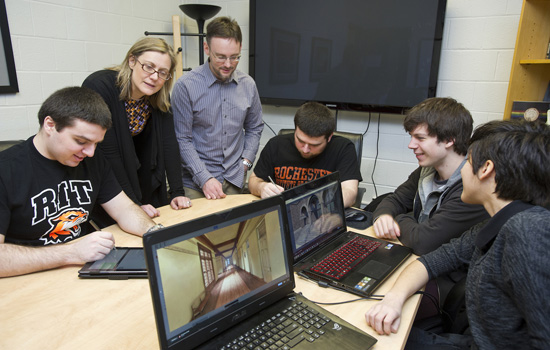RIT to offer bachelor’s in digital humanities
Degree will combine technology and liberal arts subjects
A. Sue Weisler
Lisa Hermsen, Shaun Foster and their students at work creating a virtual model of the Buffalo Asylum.
A new major being offered at Rochester Institute of Technology is designed to change the way people think of a liberal arts degree.
A bachelor’s degree in digital humanities and social sciences – the first of its kind in the nation – will combine core liberal arts studies with technical courses such as computer programming to better prepare graduates for employment.
Students will be registered in Fall 2016.
“After decades of increased demand for specialized, highly technical skillsets, employers – and society – are facing a problem. They’ve found many of today’s challenges cannot be solved by technology alone, and many professionals lack the broad skills to play a role in driving change,” said James Winebrake, dean of RIT’s College of Liberal Arts. “There is a great need for more intentional integration of liberal arts disciplines into STEM (Science, Technology, Engineering and Math) curricula.”
Students in the degree program will use new and emerging technology in their humanistic and social science studies. For example, their research could involve developing computer programs to mine data or digitally preserve artifacts and literature found in museums and libraries.
“We think this is going to change the way people think about liberal arts degrees,” said Lisa Hermsen, RIT’s Caroline Werner Gannett Chair of Humanities. “We know employers want students with strong communication and critical thinking skills. Now we’re adding computational skills and the ability to use and work with digital tools.”
The bachelor’s degree program will be in addition to a program offering a minor in digital humanities, which was offered at RIT two years ago. More liberal arts backgrounds have been infused in traditional technical majors, part of RIT’s strategic plan to offer more educational opportunities with collaboration across departments and other colleges at RIT.
All RIT students, regardless of their majors, are required to take liberal arts courses.
“RIT is poised to offer the new major because we have exceptional programs already in humanities, social sciences, information technology, game design and media studies,” Hermsen said. “Now we are bringing this all together to educate students on the important role that technology plays in today’s world and what it means to be human and live socially.”
The students majoring in digital humanities and social sciences will start learning basic programming and design principles in web development courses as well as learning the history of media technologies and digital culture. Later, they will construct the core of their curriculum to shape a degree that will meet their career desires.
Courses being offered include Culture and Computers, Media Archeology, Digital Storytelling and Ethics in the Emerging Digital Era.
Students will follow RIT’s co-op model of at least one semester of experiential, on-the-job learning.
Tamar Carroll, a faculty member in RIT’s Department of History, will be the program’s first director. An advisory board will include members from RIT’s College of Liberal Arts, B. Thomas Golisano College of Computing & Information Sciences and the College of Imaging Arts & Sciences.
“This benefits not just students in liberal arts, students and faculty in all three colleges are going to benefit,” she said.












